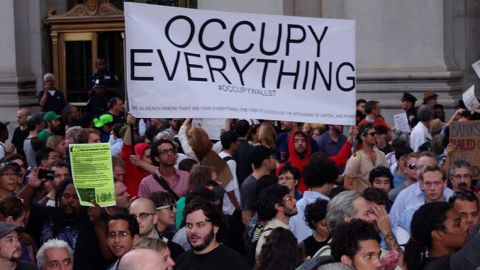Occupy Wall Street Should Seek Corporate Governance Reform

If I had to give the Occupy Wall Street movement a piece of advice, I would tell them to focus their growing chorus against Wall Street excesses on corporate governance reform. In the half an hour or so I’ve spent surfing the comments on www.OccupyWallStreet.org, I’ve seen an alarming amount of chatter about amending the Constitution to “end corporate bribes”, which sounds a lot like the Tea Party rhetoric that ignores how unrealistic it is to accomplish.
Corporate governance may sound innocuous, or tedious, or overly academic, but if this movement wants to put the fear of God into the corporate chieftains who are looking down from their towers in Manhattan at the masses below, it needs to take the time to explain to its foot soldiers exactly how power is wielded in a modern corporation.
“U.S. restrictions on shareholder rights reflect the fact that U.S. companies are less controlled than non-U.S. companies by dominant shareholders. The U. S. has traditionally believed that directors are best placed to protect widely fragmented shareholder interests, e.g., long-term investors versus speculators, retail versus institutional, and large positions versus small.”
All of the power of a corporation stems from the way it governs itself – from the way its bylaws, rules and regulations determine who has what say so in how the company is run. The number one fallacy about public companies that permeates popular culture are shareholder rights. Shareholders, according to popular lore, wield the power to elect officers, board members, and other representatives. It is also widely believed that a majority of shareholders who band together can dictate the direction of the company.
These things have not been true for a very long time.
In practically every instance that a shareholder proposal is broached, Super Corporations get their general counsels or outside counsels to issue a statement, one that normally contains language—“Super Corporation strongly urges the SEC to reject the shareholder proposal”—that denounces and rejects any overtures by shareholders to make it easier for them to have a voice in company matters. Combine that stance with a board of directors that most shareholders have never heard of—a board comprised of individuals the CEO is often intimately familiar with—and you have an entity that in effect answers only to itself, even as it sits atop a pile of other people’s money. It is this power, largely unchecked, that allows these corporate chiefs to direct the billions needed to bankroll the army of lobbyists who really run Washington.
My corporate governance reform idea may not be the answer, but it is clear that what we have now only really works for the best interests of a few people. I have to wonder if the Occupy Wall Street movement, especially so soon after the Tea Party phenomenon, is a signal that Americans are ready for a more sophisticated brand of political discourse than our elected officials are currently willing to provide.





